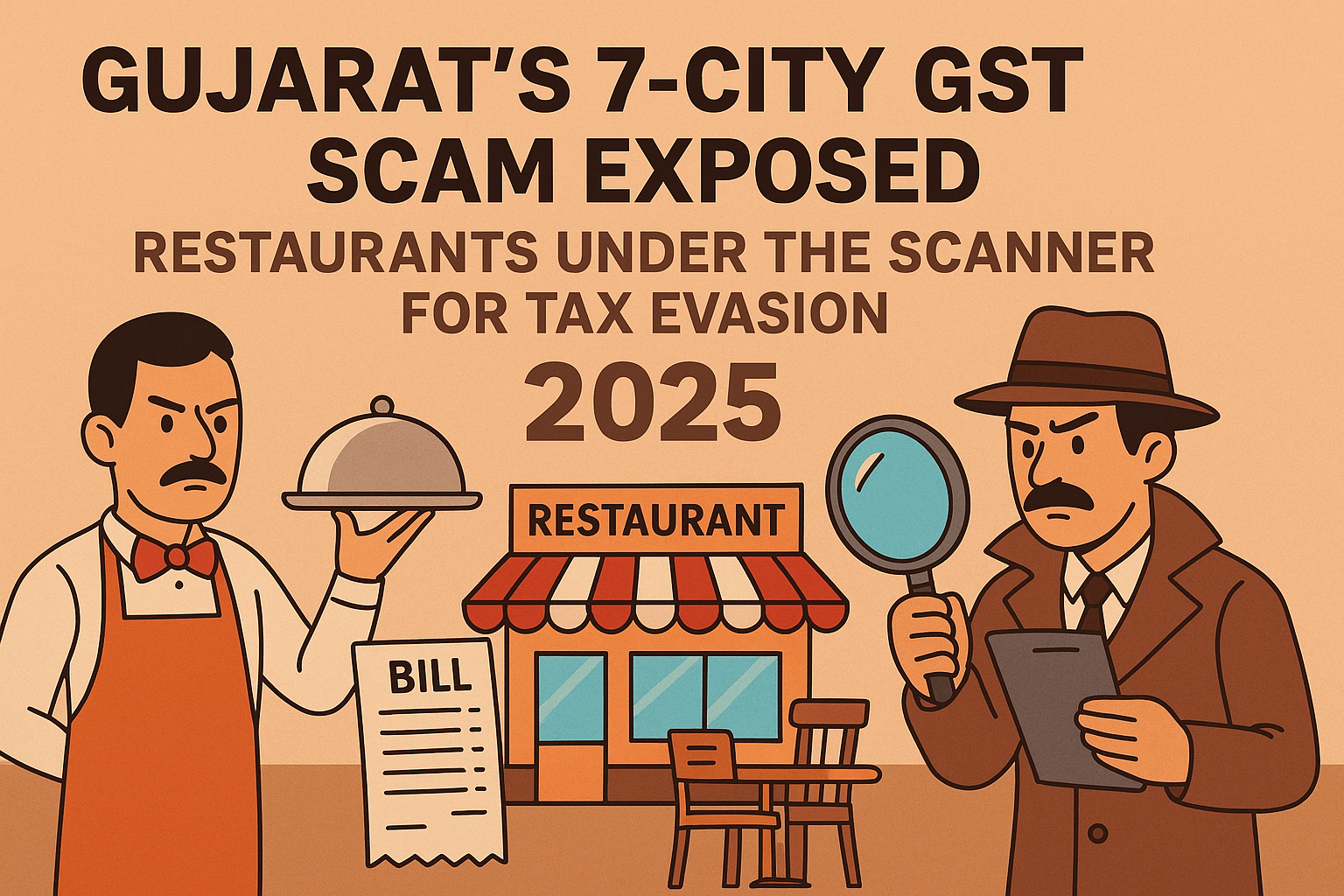GST Scam are not new in India, but Gujarat’s latest restaurant scam has shocked both authorities and customers alike. A multi-crore GST evasion case spanning across seven major cities—Ahmedabad, Surat, Vadodara, Rajkot, Bhavnagar, Jamnagar, and Gandhinagar—has revealed how eateries manipulated accounts, created fake invoices, and dodged their tax responsibilities.
According to officials, the estimated value of the scam is over ₹500 crore, including ₹52.07 crore recovered or traced so far, making it one of the largest GST frauds in the hospitality sector. The investigation is ongoing, and authorities believe more outlets may be involved..
This blog explains the scam in detail, connects it with the Central Goods and Services Tax Act, 2017 (CGST Act), and highlights lessons for businesses and customers.
Table of Contents
The GST Scam Exposed
In joint raids conducted by the Directorate General of GST Intelligence (DGGI) and the state GST department, investigators found shocking evidence of malpractice. Restaurants across Gujarat were caught using multiple tricks to hide their real income. The findings included:
- No bills issued for cash transactions, making sales invisible to authorities.
- Parallel billing software—restaurants maintained one real software with correct sales data and another fake one for GST filings.
- Hidden cash sales, ensuring turnover appeared smaller than it actually was.
- Fake Input Tax Credit (ITC) claimed through bogus invoices generated by shell suppliers.
Preliminary estimates suggest that this scam has caused hundreds of crores in tax revenue loss to the government.
Tricks Behind “Cooking the Books”
The phrase “cooking the books” refers to manipulating financial records. In Gujarat’s case, restaurants employed multiple tricks:
- Bill suppression – Customers, especially those paying in cash, were served meals without any bills generated. This allowed sales to go unreported.
- Dual accounting systems – Restaurants used two sets of software: one showing actual figures, the other designed to under-report revenue for tax filings.
- Bogus suppliers and fake ITC – Many claimed ITC on invoices from companies that did not exist, creating a false credit chain.
- Under-reporting sales – Bigger outlets intentionally declared smaller turnover to stay under thresholds that trigger greater scrutiny.
These practices created an illusion of compliance while diverting legitimate tax money into private profits.
GST Act Provisions Violated
The CGST Act, 2017 has strict provisions to prevent tax evasion. Key sections violated in this scam include:
- Section 31 – Requires businesses to issue a valid tax invoice for every supply. Not issuing bills is an offence.
- Section 122 – Prescribes penalties for issuing false invoices, failing to issue invoices, or availing wrongful ITC. Penalties can be equal to the amount of tax evaded.
- Section 132 – Provides for imprisonment up to 5 years for tax evasion above ₹5 crore, in addition to fines.
- Section 16 & 17 – Allow Input Tax Credit only on genuine purchases. Fake invoices directly breach these provisions.
By violating these sections, the restaurants made themselves liable not only for heavy monetary penalties but also for potential imprisonment of owners and directors.
Why Did Restaurants Risk It?
Running a restaurant is expensive—high rents, staff salaries, electricity bills, and raw material costs eat into profits. Many restaurant owners considered tax evasion a shortcut to cut costs and remain competitive.
However, what they ignored is that GST is fully digital. With systems like E-way bills, FASTag data, payment gateways, and bank trails, mismatches are easily spotted. Once caught, the damage far outweighs the savings—from criminal cases and financial penalties to permanent reputational loss.
Fallout of the GST Scam
The scam has several far-reaching consequences:
- Revenue loss – The government lost funds that could have been used for infrastructure, education, or welfare schemes.
- Unfair competition – Restaurants evading taxes had unfair cost advantages over honest businesses that complied.
- Customer mistrust – Diners may doubt whether GST collected on bills is actually being remitted to the government.
- Increased surveillance – To prevent future scams, authorities will likely implement stricter monitoring, making compliance checks tougher for all restaurants.
Government Action Against GST Scammers
The Gujarat GST department and DGGI have already taken strong measures:
- Seized computers, billing machines, and digital accounts.
- Filed cases under Section 132 of the CGST Act against defaulters.
- Announced enhanced digital monitoring tools that cross-check actual turnover against reported figures.
Officials have also confirmed that more raids are planned, suggesting that this scam may be just the tip of the iceberg.
Lessons for Businesses
This case is a clear warning for the entire restaurant industry and other businesses:
- Always issue invoices – As mandated by Section 31, every transaction must be recorded.
- Never claim fake ITC – Sections 16 and 17 strictly allow ITC only on genuine purchases.
- Understand penalties – Section 122 and Section 132 can ruin businesses through fines and jail time.
- Adopt transparency – In a digital economy, footprints cannot be erased. Fraudulent practices will be caught eventually.
In the long run, compliance builds credibility, while evasion destroys trust and reputation.
Lessons for Customers
Customers play a role in ensuring compliance:
- Ask for bills – Always demand a GST invoice when dining out.
- Pay digitally – This creates a clear transaction trail.
- Support compliant businesses – Choose restaurants that follow tax norms honestly.
When customers push for transparency, they help in creating a fair and honest business environment.
Final Conclusion about GST Scam
The Gujarat restaurant GST scam, discovered on September 20, 2025 and valued at over ₹500 crore, is one of the largest tax evasion cases in India’s hospitality sector. It highlights a critical truth: digital tax systems cannot be beaten for long. The GST Act contains strong safeguards, and violations invite strict penalties, including imprisonment.
For honest businesses, this crackdown ensures a level playing field. For fraudsters, the warning is clear: short-term tricks may save money today, but compliance is the only path to sustainable growth tomorrow.
Contact Taxgiveindia.com for professional services.
